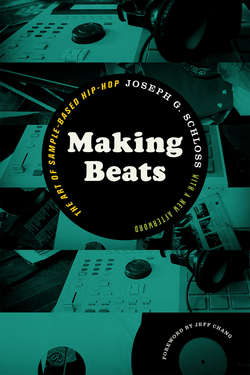Читать книгу Making Beats - Joseph G. Schloss - Страница 8
На сайте Литреса книга снята с продажи.
ОглавлениеAcknowledgments
First and foremost, I would like to thank the producers, deejays, MCs, and others who worked with me on this project. The term “consultant” is sometimes used as a semantic gambit to avoid the negative implications of the word “informant,” but in this case those who worked with me were consultants in the fullest sense of the word. They not only informed me of things but also sent me magazine articles and useful phone numbers, critiqued (and in one case pretty much copyedited) early drafts of this work, and introduced me to people, situations, and ideas I would never have found on my own.
The Seattle stage of my research was facilitated by consultants DJ B-Mello, Jake One, King Otto, Kylea, Mr. Supreme, Negus I, Samson S., Strath Shepard, Specs, DJ Topspin, Vitamin D, and Wordsayer. In various combinations, many of them also constitute crews that have worked for years to keep Seattle’s independent hip-hop scene vital. Particularly helpful to my project were Conception Records, Tribal Productions, the True Believers Crew, and Jasiri Media Group. A debt of gratitude is owed also to all the others who collectively keep hip-hop in Seattle (aka the Wetlands, the H206, Seatown, and the Two-O-Sickness) moving.
A number of people who work for hip-hop in various capacities across the United States served as consultants on this work as well: Harry Allen, the Angel, Beni B., Karen Dere, Domino, DJ Kool Akiem Allah Elisra, DJ Mixx Messiah, Prince Paul, Steve “Steinski” Stein, and Phill “The Soulman” Stroman.
As a relative latecomer to this culture (“golden era” 1987), I must also honor and thank the pioneers of hip-hop itself (far too numerous to mention), particularly those who have labored to create and maintain a positive vision and path for us to follow, who are our living connection to a time when, as Fabel says, “hip-hop was free.”
I would also like to thank the first generation of hip-hop writers and scholars, who have been an incalculably deep influence not only on this work but also on the fact that it is even possible to do scholarship on hip-hop in the first place: Tricia Rose, Stephen Hager, David Toop, Craig Castleman, Cheryl Keyes, Rob Walser, Michael Eric Dyson, Nelson George, Greg Tate, William Eric Perkins, Russell Potter, and many others.
I have been lucky enough to amass a peerless group of academic advisors—some official, some not—all of whom have affected my work profoundly: Howard Becker, Sue Darlington, Shannon Dudley, Ter Ellingson, Bernard Z. Friedlander, David Reck, Hiromi Lorraine Sakata, David Sanjek, Cynthia Schmidt, and Chris Waterman.
My contemporaries in the academic world, especially those who have one foot in the hip-hop community, have also guided and abetted me. They are the Dynamic 2 + 3 (Jeffrey O. G. Ogbar, Lizz Mendez-Berry, Jeff “DJ Zen” Chang, and Adrian Gaskins), Jon Caramanica, Kyra Gaunt, Meta DuEwa Jones, Felicia Miyakawa, Dawn Norfleet, Guy Ramsey, Ryan Snyder, and Oliver Wang.
In various capacities, my work has been supported by a number of institutions, including the University of Washington Ethnomusicology Department; the Tufts University Music Department; the University of Virginia Music Department; the Jazz and Contemporary Music Program at New School University; the Performance Studies Department at Tisch School of the Arts, New York University; Bob George and the ARChive of Contemporary Music; and the Carter G. Woodson Institute for African and African American Studies. An early foray into this material was supported by a University of Washington Dissertation Fellowship.
All of my students have influenced me, but I would especially like to thank those from my “Hip-Hop and Performance” graduate seminar at New York University, all of whom are substantial scholars in their own right: Wonderful G. Bere, Jalylah Burrell, Rhiannon Fink, and Amma Ghartey-Tagoe.
My editors at Wesleyan University Press were extraordinarily helpful, and their work is much appreciated. They are Matthew Byrnie, who guided me through the early stages of my book’s publication, and Suzanna Tamminen, who guided me through the late stages.
My friends—like (one hopes) everyone’s friends—are so essential to my ability to work that the idea of thanking them for it is almost absurd in its failure to convey the magnitude of their contributions. Thanks anyway: Andy Brown, Elle Chan, Chris Coleman, Njeri Cruse, Veronica Eady, John Elstad, Lee Ford, Daniela Garaiz, S. K. Honda, Mae Jackson, Malaika Lafferty, Mira Levinson, Spyridon “Iron Spyder” Nicon, Sandra Pai, Lorri Plourde, Mike Singer, Aaron Tucker (wherever you are, dude), Jessamyn West, and Gretchen Yanover.
Finally, people often say that you can’t choose your family, but even if you could, I would still choose mine, ’cause they’re the best: John Schloss, Suzanne Schloss, Sara Schloss Stave, and Channing M-L Stave.
